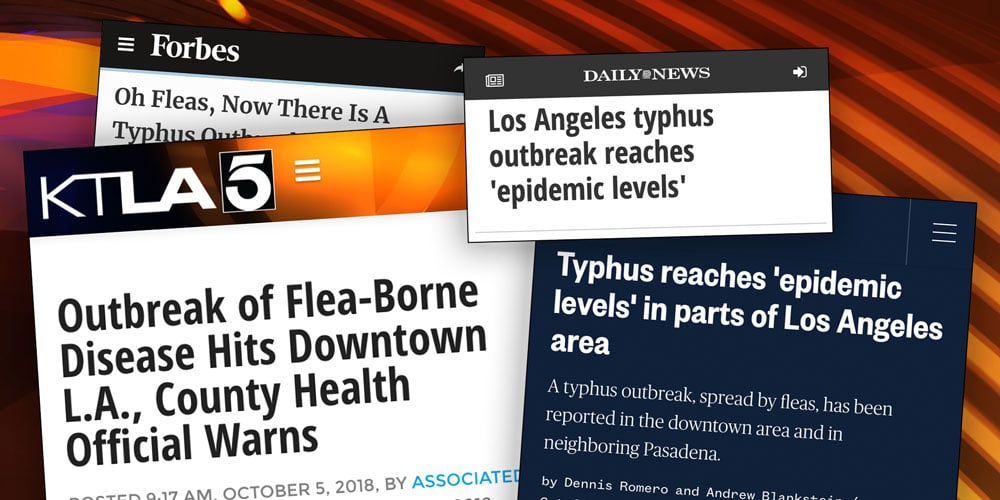
Earlier this year Dr. Drew sounded the alarm about the health epidemics that were bound to arise at the intersection of the homeless population and Los Angeles County’s sanitation problems. Unfortunately, over the past few days, this has come to pass in the form of a murine typhus outbreak that is affecting residents of Downtown Los Angeles, Pasadena and Long Beach. So far, Pasadena has been hit the hardest with twenty confirmed cases, which in comparison to the city’s the annual average, amounts to an epidemic.
Murine typhus is carried by fleas that are infected with rickettsia typhi or rickettsia felis bacteria. These fleas live on rats (family: muridae), and their poop contains the bacteria, which is transmitted to humans when it comes into contact with the eyes, mucous membranes, or the bloodstream via a cut or scrape. Due to the size of flea feces, it would be nearly impossible to pinpoint exactly when this happens, but the incubation period for this illness is approximately one to two weeks, after which symptoms may arise. These include fever, chills, headache, muscle aches, abdominal pain, vomit and rash. Murine typhus can also cause a condition called vasculitis, which is an inflammation of the blood vessels. If blood flow is restricted, organ damage can occur and have devastating consequences. Other worst-case scenarios involve meningitis and death, but fortunately these are uncommon and account for only two to four percent of cases.
Because the symptoms of murine typhus mimic other illnesses that often resolve on their own, many people don’t seek medical treatment, which means that far more are infected than are documented. It is also misdiagnosed, but can be confirmed with a blood test. Most people recover on their own, or are treated with the antibiotic doxycycline. That being said, this can be a very serious and devastating illness. Some complications can include hepatitis, gastrointestinal hemorrhage and hypovolemia (decrease in blood volume), facial paralysis and myocarditis (inflammation of the heart muscle), among others.
The illness’ association with the inhumane living conditions of the homeless population is undeniable. The squalor, overcrowding, poor hygiene and sub-standard sanitation practices that are “everyday life” for residents of homeless encampments, once again, shine a harsh light on the underlying problems of addiction and mental illness.
The good news is that murine typhus is treatable and doesn’t spread among humans, who are the end-hosts. While it can by quite serious, most people recover without complications. The bad news is that the next outbreak may be much more serious or deadly. These bugs do not discriminate. If affluent cities like Pasadena are being affected, we are all vulnerable.

Some of the links on this website are affiliate links, and as an Amazon Associate, we may earn an affiliate commission from qualifying purchases – at no cost to you.
This website is for informational and/or entertainment purposes only and is not a substitute for medical advice, diagnosis, or treatment.
© 2025 Drew Pinsky Inc. | All Rights Reserved
Get alerts from Dr. Drew about important guests, upcoming events, and when to call in to the show.
For text alerts, msg and data rates may apply